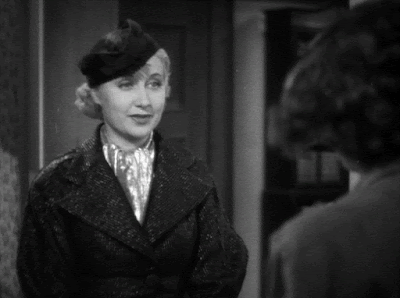Tobin's love life is a fascination for me. Her One Hour with You and Pleasure Cruise are embodiments of free love that that seem to contradict Tobin's own experiences in the dating field. Though how far is still up for investigation.
This article, from Movie Classic, discusses the impossibly high standards Tobin has for a husband. This includes, "the virility of Clark Gable, the intelligence of Leslie Howard, the dignity of Clive Brook, and, if I may say so, the sheer nerve of James Cagney." I'm sure another few film bloggers I know would add an 'amen' to that.
But Tobin doesn't stop there. The man she wants should be 1. rich, 2. not a doctor, 3. not an actor less famous than her, 4. a church-goer (denomination unlisted), 5. be able to play golf, tennis, and polo, 6. read good books, 7. drink fine wine, 8. have traveled the world, 9. like kidneys, 10. hate eggplants, 11. drink champagne, 12. cook, 13. be a Garbo fan, 14. not eat before bed, 15. not read before bed, 16. not be a fortune hunter., 17. live in England, 18. tall, 19. dark, and 20. very strong. Not exactly aiming for lowest common denominator here.
There are nice little asides that reveal some stuff I didn't know. One is that Tobin plays the harp (!). Another is that she preferred pajamas over nightgowns-- more power to her, I suppose.
Another bit goes into the actress' appreciation for Garbo,
This part may be more revealing than the rest of it, since it speaks to a certain amount of standards and judiciousness. When Tobin admits later in the article that she's a snob, that should come as no surprise-- she has high taste and high expectations. It fits in perfectly.
I also learned, besides George and Vivian, Tobin had another sibling, a brother whose name I have yet to discover. Interesting.
The last interesting bit is that she wanted two children. This never happened, so I wonder whether it was Keighley or something else that changed.
Speaking of whom, this article was published in mid-1932. Two years later and she'd meet her future husband.
Danny
Source
Hall, Gladys. (August 1932). "Why Genevieve Tobin Has Never Married." Movie Classic. p. 56, 81, 82.


























































